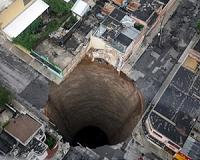| . |  |
. |
Caracas, Venezuela (UPI) Jun 7, 2010 Venezuelan President Hugo Chavez singled out Coca-Cola and Pepsi among transnational companies that would have their water use reviewed by the government as part of a widening state control on the economy. Chavez accused transnational companies of privatizing water, in the latest swipe at businesses that use large quantities of water in their production processes. Last year he penalized many Venezuelan companies that he said were wasting water. Chavez said all water belonged to the people, calling it a "social property." Venezuela suffered prolonged water shortages and introduced water rationing after drought depleted reserves in the hydroelectric complexes. The water shortages also hit power generation, causing prolonged blackouts across the country. Chavez made comments about water use by foreign companies as he announced more state takeovers of private companies, including food processing firms, factories making cans and other products for the food industry and a supermarket. Among companies singled out for the new wave of nationalizations are distributors and wholesalers of food that were accused by Chavez of hoarding food supplies and violating price controls. Chavez contrasted private sector operations with performance of food factories under state control where, he said, production had hit record highs. Before the nationalization of food companies Chavez took over or closed several privately run media companies, building industry manufacturers and telecommunications operators. Banks implicated in a financial scandal were shut down earlier. The closures were followed by the takeover of more than 80 businesses that had ownership links with the blacklisted bankers. The Central Bank announced in May Venezuela's economy showed clear signs of serious contraction in first quarter of 2010 in the aftermath of power shortages brought on by the drought. The contraction in Venezuela's economy, already down 5.8 percent over a comparable period in 2009, would likely continue in the second quarter because the power shortages worsened before rain soaked the parched land in May and started replenishing the reservoirs, said the bank. Industry economists said Venezuela's gross domestic product through 2010 could dip as much as 7 percent -- the only major Latin American nation to show contraction this year. Low water levels in Venezuela's hydroelectric dam reservoirs greatly curtailed the operation of power generating turbines, causing blackouts that forced factories to shut down or limit production. Although Chavez said the return of rains would help Venezuela back to normal operations industry leaders said the effect of low electricity output would take longer to dissipate. Losses in consumer industries have been widespread, not only because of missed production targets but also because of disruptions in transport, refrigeration and storage of perishable goods. Nationalizations have added to economic uncertainty and undermined production. The economic disincentives generated by Chavez's nationalization measures and price and currency controls added to the recessionary trends. Industrial production dropped 9.9 percent in the first quarter after Chavez ordered 20 percent cuts in electricity. Inflation surged to a 7-year high, with prices rising 31.9 percent over April 2009, the central bank said. In the first quarter, transportation industry declined 15.9 percent, commercial transactions fell 11.6 percent and the financial industry sector contracted 9.7 percent, the Central Bank said. Drastic cuts in imports added to power shortages and low investment to produce those results, said the bank. Even the oil industry contracted 5 percent, more than the non-oil sector and private consumption dropped below that to 5.9 percent, the bank said. Chavez has said he doesn't mind contraction in economic growth as he wants Venezuela to shed capitalist tendencies in consumption.
Share This Article With Planet Earth
Related Links Water News - Science, Technology and Politics
 Expert: Guatemalan disaster not a sinkhole
Expert: Guatemalan disaster not a sinkholeGuatemala City (UPI) Jun 3, 2010 A Guatemalan geologist said the massive hole that opened up beneath Guatemala City's downtown is not a sinkhole but instead a "piping feature." Geologist Sam Bonis said a sinkhole is defined as an area where bedrock has been eaten away by groundwater and the 100-foot deep, 66-foot wide hole that opened up during the weekend in the capital does not qualify, Discovery News reported. ... read more |
|
| The content herein, unless otherwise known to be public domain, are Copyright 1995-2010 - SpaceDaily. AFP and UPI Wire Stories are copyright Agence France-Presse and United Press International. ESA Portal Reports are copyright European Space Agency. All NASA sourced material is public domain. Additional copyrights may apply in whole or part to other bona fide parties. Advertising does not imply endorsement,agreement or approval of any opinions, statements or information provided by SpaceDaily on any Web page published or hosted by SpaceDaily. Privacy Statement |